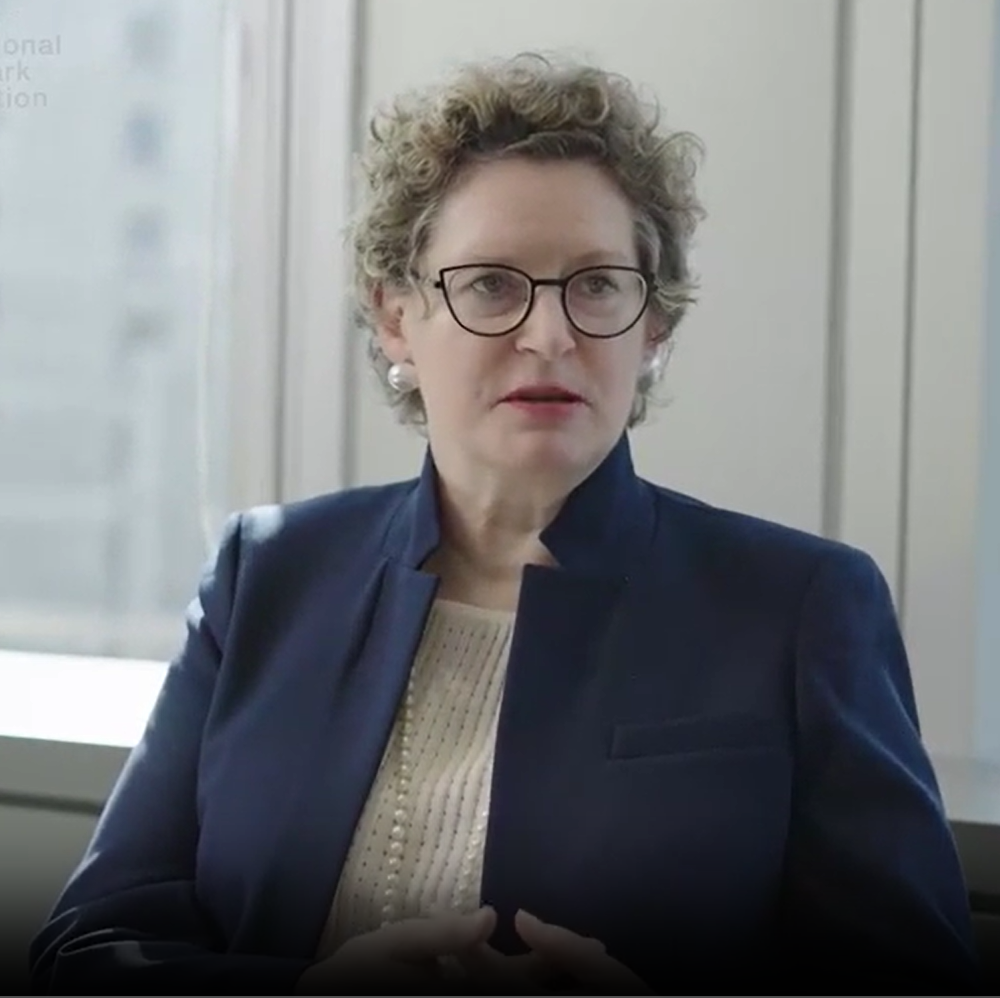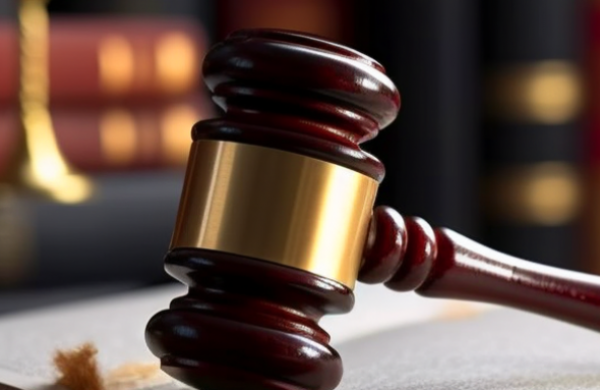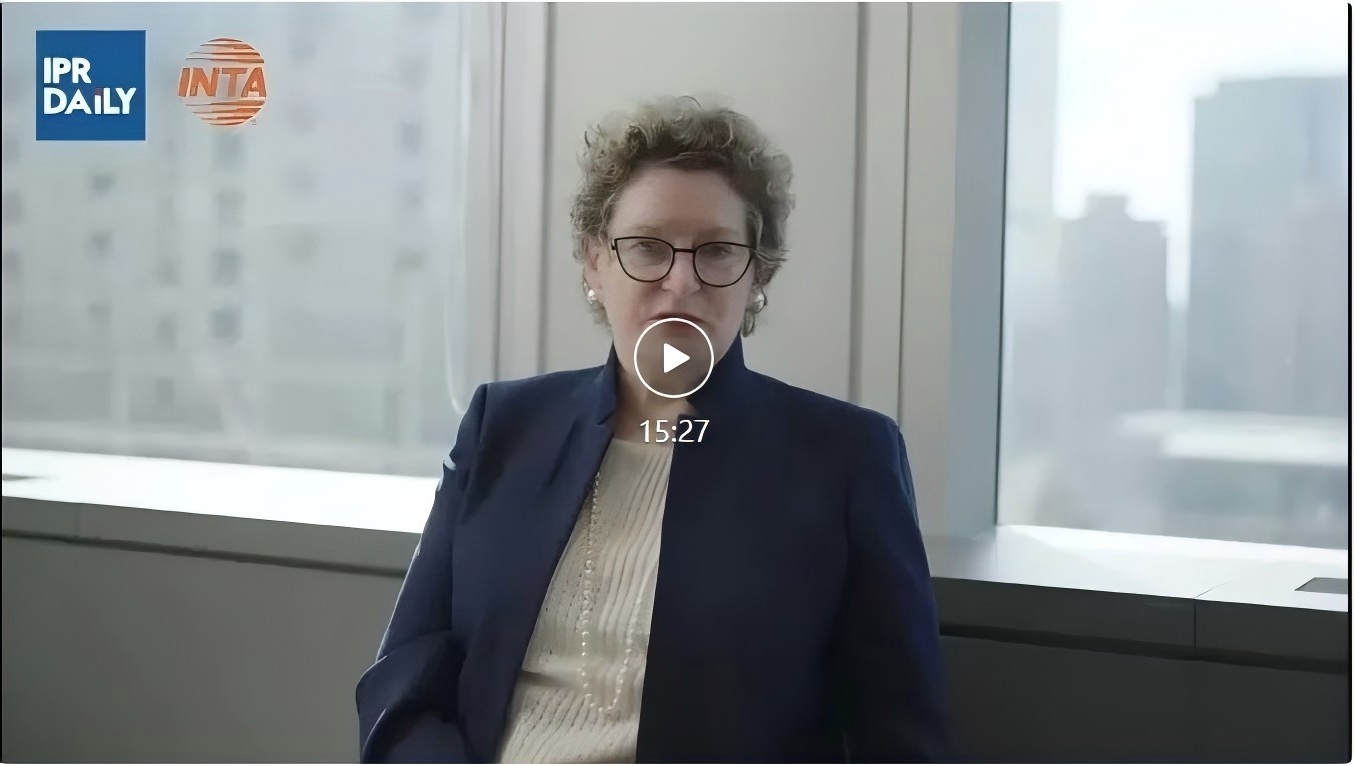Did not receive verification mail? Please confirm whether the mailbox is correct or not Re send mail

IPR Daily
- 2025-01-02 11:15:17
IPR Daily Interview|INTA CPO Heather Steinmeyer on Artificial Intelligence
Source: IPR Daily
(INTA CPO Heather Steinmeyer Interview Video)
(Click on the image to the original article to watch the video interview)

Good
afternoon, Ms. Heather Steinmeyer. It's a pleasure to be here. It's my
pleasure speaking with you this time and welcome you back to China
again. Could you please briefly introduce yourself and your role at
INTA?

Certainly.
My name is Heather Steinmeier. I'm the Chief Policy Officer at the
International Trademark Association or INTA. The role of the Chief
Policy Officer is to help establish and promote the policy agenda and
the advocacy work of the organization. That means that we are looking at
the different types of issues and positions that matter to our members
and determining how INTA should act with respect to those issues. Then
we go out with that information and engage with stakeholders at all
levels governments, intellectual property offices, courts, and many
others to help express those viewpoints on behalf of INTA's membership。

Your
role at INTA involves leading global policy and advocacy efforts. Could
you share some of the accomplishments you have achieved during your
tenure?

Sure,
I'd be happy to. I've been with the Association as a member of the
staff since March of 2023. Before that, I was a member and a volunteer
for many years before that, including serving as its president in 2010.
So I have a long history with INTA overall, but have only been the Chief
Policy Officer since March of 2023. Since that time, in terms of the
policy and advocacy work, we have established a number of high-level
policies, and we do that by getting the approval of our Board of
Directors on what those positions should be. And we've passed roughly 8
policy positions in the form of board resolutions during that time since
I've arrived. We also intervene with courts to help the law that is
made through the judiciary evolve in ways that are consistent with
INTA's policy positions. And in that regard, we've filed more than 15
amicus briefs or court interventions since I arrived. We also intervene
regularly through written submissions and comments as legislation is
developing around the world. And in that respect, we have filed more
than 75 sets of comments with different legislatures, intellectual
property offices, and to express INTA's views on particular subjects.
Here
are a couple of examples. So one of the areas that is always of
paramount importance to INTA and its membership is anti-counterfeiting
and the global fight against counterfeits. One of the areas in which
this continues to be very active and something that requires a concerted
effort is counterfeiting in online marketplaces. One of the challenges
that we saw in combating counterfeiting online is that the roles and
responsibilities of the stakeholders that are part of combating
counterfeiting are not always clear. What do the rights owners need to
do to help the marketplaces recognize and remove counterfeits from their
marketplaces? And what do the marketplaces need to do to monitor and
help try to address counterfeits even before they become bigger
problems? In that regard, one of the Board Resolutions of those 8 that I
described was focused on the role and responsibility of online
marketplaces. And that was specifically intended to address what are the
best practices and what are the minimum standards that marketplaces
need to employ in their actions to keep counterfeits off their
marketplaces. In particular, what are the benefits to the marketplaces
if they do comply with that? In other words, we believe that under those
circumstances, if a marketplace is exercising those best practices,
they should not have to be legally liable for the sale of those
counterfeits on their marketplaces. So that is one example of a board
resolution that we have passed in the last few months
Another
example is that abuse of brands in Internet domain names is another
type of topic that is always of interest to our members. One of the
things that has been challenging in acting in that space is that there
is not a consistent definition of what constitutes domain abuse.
Different organizations, including ICANN, one of the Internet governance
organizations, have definitions that in our view are too narrowly
focused on things like phishing and malware and other forms of online
fraud, and only address brand misuse in that context. We believe that a
better definition is a broader definition that essentially states that
domain abuse should constitute any use of a brand, unauthorized use of a
brand, in a domain name or another domain identifier that can lead to
deceptive, malicious, or illegal activity. Once we have these types of
policy positions established in the form of a Board Resolution, that
enables INTA, through its staff and its committees, to engage with
governments and other leaders to seek to try to encourage the adoption
of that definition, which then allows for perhaps more effective
enforcement and protection of brands in connection with domain name
abuse. So that's just to give a couple of examples of the types of
policy positions that we have established in that set of resolutions and
amicus briefs and comments that we've made.

Thank you for your answer. Artificial intelligence has become a trend of the times, even being called the Hallmark of the Fourth Industrial Revolution. What key changes do you think AI will bring to the field of trademarks and the intellectual property legal framework, and will potential risks matter rise?

There
is not just one, there are many. INTA has a number of committees that
are looking into the types of questions that AI is raising with respect
to whether current intellectual property law frameworks are adequate to
address the developments that AI is introducing into the way that both
individuals create information and content and ideas, and also the way
that AI is contributing to the development of content now. One of the
things that's very important from INTA's perspective is not only to be
looking at the specific issues, and I'm happy to talk more about those
issues, but also that we do so in a coordinated way. Because there are
so many issues, we want to make sure that our policy positions are
consistent and reflect a holistic approach with respect to the
overarching challenges that AI raises from a legal perspective. And from
that point of view, we have created an AI Advisory Council, which is a
group that is overseeing the work of more than 15 different work streams
looking at discrete issues to help make sure that those groups are
coordinated and the results that we produce are consistent across the
organization. We're also very much focused on how we can help our
members both use AI and for the betterment, if you will, of the IP
profession and how we all operate, but also how they can be prepared to
respond to the challenges and the risks that AI is creating. So, from
that point of view, we are developing programming and publications and
other mechanisms to help our members understand how AI is likely to
affect the advice that they need to give to their clients or if they are
corporations and businesses, how those businesses need to anticipate
the issues that AI is going to raise.
To
give one specific example there, in March of this year, INTA held a
two-day Business of AI conference in New York, which was focused
entirely on the way in which AI is affecting the legal profession, not
only in terms of the legal issues it's raising, but how it is being used
by the legal profession as a tool to do jobs.
So
there are multiple dimensions to how we are approaching AI, both in
terms of the legal risk and the practical applications of AI to the
business of law.

Thank
you for your answer. The advent of products like ChatGPT has made many
legal professionals worry that AI will replace their jobs in the future.
A 2023 Report estimated that currently 44% of the tasks in the legal
field can be automated. What is your opinion on this?
We
agree that there are certain routine tasks that AI is likely able to
perform as well or better perhaps. However, we also believe strongly
that there is a great deal of potential for AI to enhance the jobs of
current legal professionals. AI is a valuable decision support tool.
Legal professionals these days are faced with an enormous amount of
information that can guide and impact on the advice that they are giving
to their clients, whether those clients are within a business or it's,
for example, a law firm advising a business. There is case law. There is
legislative change. There is geopolitical change. There is economic and
business change. All of these things are factors in the advice that
lawyers give. AI can be a very effective way to help lawyers harness
more information and better advise their clients. And so from that point
of view, we think that AI can be a very powerful tool to help
professionals succeed and operate at an even more sophisticated level.
With respect to perhaps more junior jobs in the legal profession, it's
important that those attorneys and other legal professionals also
embrace AI. There was an interesting quote that came out of the AI for
Business conference that I mentioned, which is that legal professionals
need to worry less about AI replacing their jobs and more about their
jobs being replaced by another lawyer who understands how to use AI.
The
types of roles that more junior professionals have perhaps played in
the legal profession can also be enhanced by the use of AI. It will be
the attorneys and the other professionals who can draft a good prompt
for AI to get the best and most reliable results and understand what it
takes to use AI and recognize the quality of the results and be able to
assess that that are likely to succeed in our view. We think that at the
end of the day, the profession should thrive with the support of AI.
From that point of view, we are providing resources to our members like
the Business of AI conference to help them understand what these changes
will mean and adapt to that.

Thank
you for your opinion. The EU's Artificial Intelligence Act has
officially come into effect. What is your view on this Act?

It
has recently come into effect, and we have not yet seen enough
implementation under the Act to really be able to assess its full
effectiveness. So I would say that right now we are in a bit of a Wait
and See Mode with respect to the Act itself. However, there are some
principles that are in the Act that we think make a lot of sense. In
particular, the Act has created various risk levels depending on the
application of the AI tool and seeks to apply greater controls and
governance and oversight with respect to the higher risk levels or
applications of AI capabilities. Some examples of things that might be
higher risk would be healthcare applications where there's a great deal
of personal and medical data involved, defense applications, information
security. And the approach, in the act of stratifying the risk and
putting in place appropriate requirements depending on the level of
risk, we think makes a lot of sense.

Thank you for your answer. How does INTA help its members cope with the challenges brought by artificial intelligence and what practices and research can INTA share regarding this emerging field?

So
I've mentioned a couple of the ways in which we are responding in terms
of coordinating our policy development efforts through the AI Advisory
Council. I've mentioned the Business of AI Conference. We're also
engaging very regularly with stakeholders such as legislators and
intellectual property offices in the form of policy dialogues and
responding to their listening sessions as they attempt to understand how
they should be approaching AI. We do this on behalf of our members to
help reflect INTA's approach and thinking on this as we simultaneously
develop our policy positions. In addition to that, we are regularly
publishing articles and information intended to help our members
understand the issues and get them thinking about perhaps how those
issues apply in their businesses.
When
we look at technology more broadly, AI is a current hot topic in
technology advancements that are affecting intellectual property owners
and law. But it's certainly not the only one. There have been many
topics in the past and there will be topics going forward. One of the
roles that INTA plays is to look into the future. And in that respect,
we have regularly published what we think of as Think Tank reports,
which are intended to anticipate the impact of technology advancements
of various types and provide advanced guidance to our members on how
best to address that. So I would expect to see more work like that
coming out in the area of AI. And I know that we have a number of White
Papers and works at the moment on various topics dealing with AI that
will contribute to that body of work for our members.

Thank you for your answer.

Thank you.
Note: The above Chinese translation is for reference only and is intended to help readers understand the content of the interview. for INTA's official position and policies, please refer to its official website and official documents issued by INTA.
Source: IPR Daily
- I also said the two sentence
- Also you can enter 140words
 TOP IPR U.S. Lawyers 10 & Firms 10 Selection Officially Launched by IPR Daily
TOP IPR U.S. Lawyers 10 & Firms 10 Selection Officially Launched by IPR Daily WIPO Global Innovation Index 2025: China Enters Top 10
WIPO Global Innovation Index 2025: China Enters Top 10 Singapore ranks 5th in the 2025 Global Innovation Index; climbed two spots in Innovation Outputs
Singapore ranks 5th in the 2025 Global Innovation Index; climbed two spots in Innovation Outputs Federal Circuit lacks jurisdiction over award that doesn’t raise issue of patent law
Federal Circuit lacks jurisdiction over award that doesn’t raise issue of patent law



